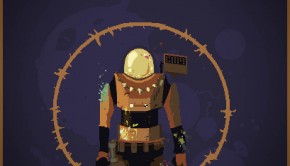Filippo Beck Peccoz Interview: Scoring with a Musical Toybox
Filippo Beck Peccoz is a Munich-based, Berklee-trained game composer who has worked on over 20 independent game titles over the last five years. Highlights of his demo reel include his contributions to the Bomberman series, his AGMA-nominated toybox soundtrack to The Last Tinker: City of Colors, and his latest soundtracks Shift Happens and Together.
In this interview, Beck Peccoz discusses his experiences breaking out as a game composer as well as his highlight works. He puts special attention to his roles at Berklee, his approach to sampling and mixing often-surprising instruments, and talks about his philosophies on how game sound creators should be actively involved in the game design process.
Interview Credits
Interview Subject: Filippo Beck Peccoz
Interviewer: Chris Greening
Editor: Chris Greening
Coordination: Chris Greening
Interview Content
Chris: Many thanks for talking to us today, Filippo Beck Peccoz. First of all, can you tell us about your musical background and education? What led you on the path to becoming a game composer?
Filippo Beck Peccoz: Thank you for having me! So, without question, my first love was games. I used to have my older sister sit next to me while I was playing Mega Man 2 on the NES: she had to hold a tape recorder next to me as I was singing the main melody while playing the game! I’m not sure if she enjoyed herself very much, but I appreciate that she did it nevertheless.
Then, at the relatively late age of 14, my brother bought me a guitar as a gift and something clicked. Music came into my life in a much more active way, I taught myself how to play and spent the remaining high school years playing with friends, mostly in trash metal cover bands. Good times!
After school, I applied to Berklee and got into the Film Scoring Program. Apart from the thrill of studying at this particular school, it was the fact of being able to live in the US and change my life completely that made these years so intense and important.
Chris: A game music aficionado, you were the president and bandleader of the VGMC (Video Game Music Club) at Berklee. Can you tell us about what inspired these activities and what they involved?
Fillipo Beck Peccoz: I have to say that although I love the world of film, my decision of studying film scoring stemmed from the absence of an actual video game music degree back in 2006. I just went with the “closest” field!
While at Berklee, I had this idea of bringing together more students who love game music, at first with the intention of listening to old soundtracks and generally create a meeting place for game music lovers. This quickly evolved into a mission: making game audio a recognised and respected field at the college. All the people who joined the club and I had this desire to see it happen at Berklee. We started organizing events with professionals from the industry, from Tommy Tallarico to Clint Bajakian, Chance Thomas and several other talented composers. We were determined to give game audio a voice at Berklee.
Many professors, especially Dan Carlin and Jeanine Cowen, supported our endeavours to make game audio “bigger” at the school. We eventually got invited to play video game covers at the G.A.N.G. Awards during GDC for two years in a row, strengthening the relationships between the school and the industry (also, first time at GDC with friends, sponsored by your college, and asked to play music in front of some of your heroes… we were completely floored by the opportunity).
Chris: Do you think such activities were a cornerstone for Berklee becoming a renowned school for video game music?
Fillipo Beck Peccoz: With Berklee being such a forward thinking school, I’ve no doubt that it would have happened sooner or later. But we definitively gave a big speed boost to the process: not only through the events and such, but also because we were all so passionate about the subject.
After about a year and a half since the club was founded, and while I was still a student, the school hired Michael Sweet as the first interactive music professor and the first prototype courses for game audio appeared. It was so exciting! These felt like, and truly were, pioneering days.
By now, Berklee offers a minor in Video Game Composition and nobody questions the importance of game audio at all anymore. The club is still very active today and has spawned projects like the Video Game Orchestra (VGO) and the Video Game Choir, both very successful. Many ex-members from the earliest times are now actively working in the industry, which makes me happy!
Chris: Since then, you have worked on a large number of game projects. Can you tell us about how you have developed a niche? How have you established and cultivated links with so many developers over the years?
Filippo Beck Peccoz: After school, I was presented with the rather difficult choice of either staying in the US or returning to Europe. I knew that I had to decide if I wanted to spend a very large amount of time away from my home continent, and decided against it.
Back in Munich (my hometown), I wasn’t even sure an industry existed at all! But a visit to the Global Game Jam in early 2010 opened up several opportunities, and I started meeting the locals who were in games. I always prefer working with people locally (when possible of course), gals and guys you an go drink a beer or two with after the work’s been done. I’ve been very lucky to meet people who I can connect with on a human level easily, and who also happen to be in games. My club activity in college also helped a lot in removing hesitation when contacting and approaching people.
Chris: Your AGMA-nominated score for The Last Tinker: City of Colors is perhaps your best-known project to date. Could you share how you captured this youthful action adventure with your music? Were any soundtracks inspirational for you?
Filippo Beck Peccoz: When I first heard the temp music that the game designers from Mimimi Productions chose for most of the levels, I already knew I was going to love the project: it consisted mainly of excerpts from various Thomas Newman scores. He’s my all-time favourite film composer, and I just love the way he can bring textures — not only melodies, but an instrument’s “colour” — to tell the story (and I also admire the broadness of styles he is an absolute master of).
I really was free to experiment to my hearts content with The Last Tinker: from detuned Mandolins in folkish upbeat tunes to chopped up piano notes during an ambient-scary track, this soundtrack demanded lots of different moods. It was wild and fun, a lot of fun.
Making music was the easiest part of the project. My wife and I also handled all the sound effects, voice over recordings, ambience implementation etc. Compared to these tasks, the music composition days felt like a vacation!
Chris: You also blended hypnotic sounds with action tracks on Sleep Attack. Could you share your experiences working on this twist on the tower defense formula? How did you reunite such disparate elements to create a nevertheless well-rounded score?
Filippo Beck Peccoz: Sleep Attack by the Italian team Bad Seed had to have this cartoonish and a bit psychedelic vibe but without straining the player’s ear: the levels get fiendishly difficult in later stages, so having a dreamlike/hypnotic element was important (and also underlined the crazy colours and characters in the game). The music gets more frantic when the last enemy wave arrives: it’s a simple trick, but it heightens the sense of urgency very well.
I like working on these groove-oriented, synthy scores, and blending acoustic sources with the completely synthetic elements. It’s probably one of the things I like to do the most.
Chris: The Last Tinker: City of Colors and Sleep Attack reveal you’re incredible versatile. Can you tell us how you became so adept at a range of genres? How did you develop skills as an orchestral, electronic, and world music composer?
Filippo Beck Peccoz: Thank you! I think part of it come from the film scoring study, which forces you to experiment and know several styles. At the same time, I’ve always listened to quite many genres of music and love trying to find out what their true “root” is. I think that finding out the one or two main elements that define a genre and making it yours, understanding it, is the way to go.
Of course, it’s important to not stop at the most trivial “impersonation” of a genre: the more you are open and honestly want to learn about a new genre, the more you will be able to absorb it without doing an injustice to it.
Chris: The production values of the soundtracks are also impressive. Can you tell us how you have achieve this? What hardware and software do you use to bring your music to life?
Filippo Beck Peccoz: Thanks again 
Synth-wise, I love working with Xfer’s Serum and u-he Bazille, as well as a Moog Slim Phatty and a little Modular Synth I’ve been building. I know it’s sort of a fetish thing, but I’m no “hardware snob”, as I think that certain plugins sound really amazing by now. But the madness of wires hanging everywhere and the inspiration you get during a hands-on-hardware synth session is wonderful to me. I just record everything that comes out of that infernal box and pick out the good/usable parts. I love it!
Chris: Do you also work with performers?
Filippo Beck Meccoz: For instruments, I record all guitars and related instruments myself, and we often do sampling sessions with junkyard instruments and weird objects. There’s a sort of “toyshop” sound I really like and often use, which comes from choosing acoustic sound sources and altering them “in the box” afterwards, or just finding creative ways to trigger these samples. I’m very fond of this workflow, and I think that for a composer it’s crucial to have your own sound palette that can blend with more commercial libraries, but still have your own fingerprint on it. I have a couple of mics I use for this (most of the time Shure SM81s) and a UA 610 preamp, that’s about it.
Performer wise, I love collaborating. Musician friends come over or record parts in their studios. Just a set of fresh ears on a project works wonders, and a performer always adds a new world to any song. Even just one single great violin player heightens the whole quality of a production in dramatic ways. In the very beginning in college, for the first year or so, it was a bit hard for me to resist my inner “studio caveman” and open up to sharing work in progress songs and involving other musicians, for some reason. Maybe I just needed to grow more confident, but once I did I had much more fun, and the music also benefited greatly.
On many projects, I have a great engineer who works on the mix and master of the song. Whenever the budget and time allows I call him. The difference is night and day to me, and it’s so exciting to have him work his magic on my music.
Chris: You also co-composed Bomberman Live and Bonk: Brink of Extinction. Could you share us your inspirations for these soundtracks? What was it like to work on established intellectual properties such as these?
Filippo Beck Peccoz: These two projects were the first after graduating from Berklee. My good friend Rich Vreeland (aka Disasterpeace, an incredibly gifted composer that I had the pleasure to meet way back during the Berklee days) and I got these two gigs in “a bundle”, so to speak.
It was fun to have a pool of themes and sounds to pick from and reinvent for the games. Especially Bomberman triggered many memories of me playing with my friends back in the day. Unfortunately, Bonk never got released, so we ended up not hearing our music in the game. In a way, I’m happy that this happened early in my career, since it taught me to never take the release of a title for granted.
Chris: Your latest works are Together and Shift Happens. Can you tell us about how you approached these soundtracks and what we can expect from the soundtracks?”
Filippo Beck Peccoz: Both are so called “couch co-op” titles, with Shift Happens leaning heavily on a slapstick sort of humour, vibrant colours and the ability of “tricking” your partner although you’re supposed to collaborate. The soundtrack has a lot of groovy tracks and a very present main theme and bass riff, which appear in every single track under various guises. I loved working on a particular section of the game, the canyon. I took some cues from the stoner rock genre, grabbed a baritone guitar and went for it.
Together, on the other hand, is set apart by their characters and its story, which has been written by Saladin Ahmed. There’s a sense of melancholy that needs to be transported, but at the same time we wanted to tip our hats to the 16 bit RPG era, so again, there’s this mix between clearly synthetic sounds and acoustic material. The wonderful flautist Laura Intravia played and sang for several songs.
Chris: You mentioned that there are several new games that you are presently working on. Could you elaborate on what we can expect?
Filippo Beck Peccoz: I’ve recently completed audio for an upcoming iOS title, Ellipsis, by my friend Yacine Salmi. There’s no traditional soundtrack per se: the objects in this abstract, top down action-puzzle game are little instruments themselves. Very electronic and a completely different challenge!
An ongoing project of mine is Fairytale Distillery’s MMO Das Tal. It’s special to me in that we’ve decided to avoid music that isn’t directly tied to the game world. This led us to experiment with in-game instruments, like Windharps and Windchimes, all linked to the position of the player and other factors. We’ve been programming these little instruments and placing them in the map- some are sample based, others work with oscillators and effects in realtime to generate the sound.
Also, next month I am starting composition work on Mimimi Productions’ newest title set for release next year: I can’t say much yet, but I’m studying the traditional music of a particular country I love very much… and I’m extremely excited about it. It will be the biggest project I’ve ever worked on.
Chris: You’re also preparing to release your own game, Josephine…
Filippo Beck Peccos: Josephine is an experimental mobile game concept that my wife and I created in 2012. It’s a cross between a watercolor-styled storybook and a set of musical instruments, pretty far away from traditional game mechanics. Due to the amount of projects coming in, it always had to wait in line, and by now, we probably would have to integrate VR into the concept! We’re planning on picking up development towards the end of next year.
Chris: Many thanks for your time today, Filippo. Is there anything else you’d like to say about yourself or your works? Do you have any messages for your fans around the world?
Filippo Beck Peccoz: Thank you so much for this opportunity! To finish, I wanted to say that I learned a lot from listening to the developers, understanding their set of challenges and generally just “interfacing” with the production process more. As game sound creators I think that we need to have this technical mindset (especially when the teams are small to medium sized) and propose and experiment with different sound systems and musical ideas. Game audio is still developing a language of its own and it’s up to us to define it.
I feel blessed to be able to work in this field, which I find is the most exciting for musicians at this moment in time. I’ve met great people and I hope to be journeying onward to new musical adventures with them, and with new collaborators. A heartfelt thanks also to who listens and enjoys my music, to reviewers who take the time to listen to the audio aspects of any game and also to those who criticize my work: there’s always something to learn.
Posted on November 29, 2015 by Chris Greening. Last modified on November 30, 2015.
















